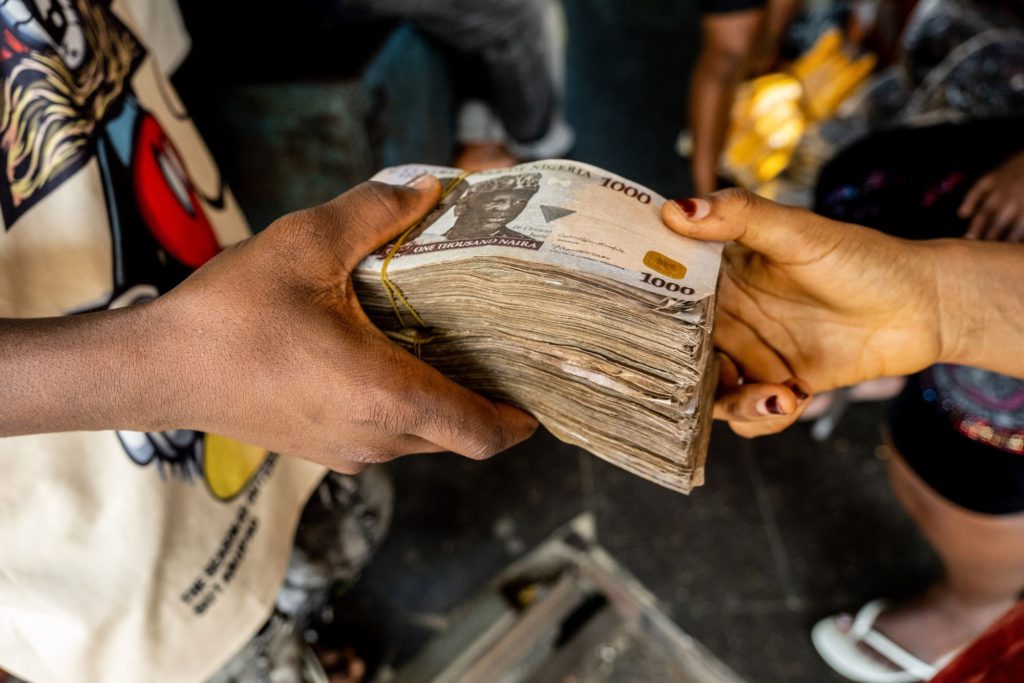Nigeria’s central bank said it’s move to replace high-value currency notes will help prevent hoarding and stymie illegal activity and kidnappings in Africa’s largest economy.
(Bloomberg) — Nigeria’s central bank said it’s move to replace high-value currency notes will help prevent hoarding and stymie illegal activity and kidnappings in Africa’s largest economy.
The country’s banking regulator plans to issue redesigned 200-, 500- and 1,000-naira notes from mid-December, Central Bank Governor Godwin Emefiele said at a briefing in Abuja, the capital, on Wednesday.
Old bills will cease to be legal tender starting Jan. 31, giving citizens of the West African country, where cash dominates transactions, six weeks to exchange their notes. The country is scheduled to hold presidential elections 25 days later.
“At first sight, with the very ambitious timeframe outlined, this looks like an attempt by Nigeria to deal with illicit funds,” said Razia Khan, head of research for Africa and the Middle East at Standard Chartered.
“Given problems related to crude theft and security, this is understandable.”
The central bank says it doesn’t have visibility on 85% of cash in Nigeria, which is undermining the efficacy of monetary policy and the integrity of the currency, according to Emefiele.
The authorities operate a multiple exchange-rate regime dominated by a tightly controlled official exchange rate and a parallel market where the naira is freely traded — while the former has weakened less than 10% since December, the latter is down by nearly a third within the same period, according to Bank of America.
Read: Naira Likely to be Devalued by 20% in 2023, Bank of America Says
The move to ban the notes may lead to chaos in the country of almost 220 million people, the majority of whom live in rural areas away from bank branches.
Six years ago, Indian Prime Minister Narendra Modi’s decision to outlaw high-value currency overnight led to a prolonged scramble for cash and slowed economic growth in Asia’s third-largest economy.
Nigeria’s previous attempt at demonetization also didn’t go according to plan.
In 1984, President Muhammadu Buhari’s military government changed the color of currency notes in an effort to combat corruption — Buhari was removed from office in a coup the following year and the naira was devalued a year later.
Scramble for Cash
Nigeria’s cash in circulation has more than doubled since 2015 to 3.23 trillion naira ($7.3 billion) as of September, Emefiele said.
“It is unacceptable and indeed it takes the control of money supply out of the hands of the central bank,” Emefiele said.
The measure is expected to have a “positive impact” on the inflation rate, which climbed to a 17-year high in September, he said.
While the introduction of new naira notes is unlikely to have an impact on the currency’s official exchange rate, it could bring pressure to bear on the widely used black market rate, said Samir Gadio, head of Africa Strategy at Standard Chartered Bank.
The naira weakened 3.3% to 775 per US dollar in the illegal market as residents sought to convert cash into dollars, according to Yahaya Adamu, a trader on the streets of Abuja, the capital.
The central bank’s official rate fell 0.1% 441.66 — a record low.
Ransom Payments
Nigeria’s anti-graft agency warned bureau-de-change operators and lenders not to “assist unscrupulous customers in laundering suspected proceeds of crimes through their system” during the currency-exchange process, according to an emailed statement.
Operators must be “wary of currency hoarders who would attempt to seize this opportunity to offload the currencies they had illegally stashed away,” the agency said.
Emefiele said that reducing the amount of cash in circulation would minimize “access to large volumes of money outside the banking system used as source of funds for ransom payments.”
The West African nation has been faced with a widespread abduction-for-ransom crisis.
The bank also plans to mint more of its eNaira digital currency that has struggled to gain traction after its launch a year ago.
Only 1 million people have downloaded an eNaira wallet since its introduction and transaction volumes have been negligible.
Read: Digital-Currency Plan Falters as Nigerians Defiant on Crypto
–With assistance from Monique Vanek.
More stories like this are available on bloomberg.com
©2022 Bloomberg L.P.











